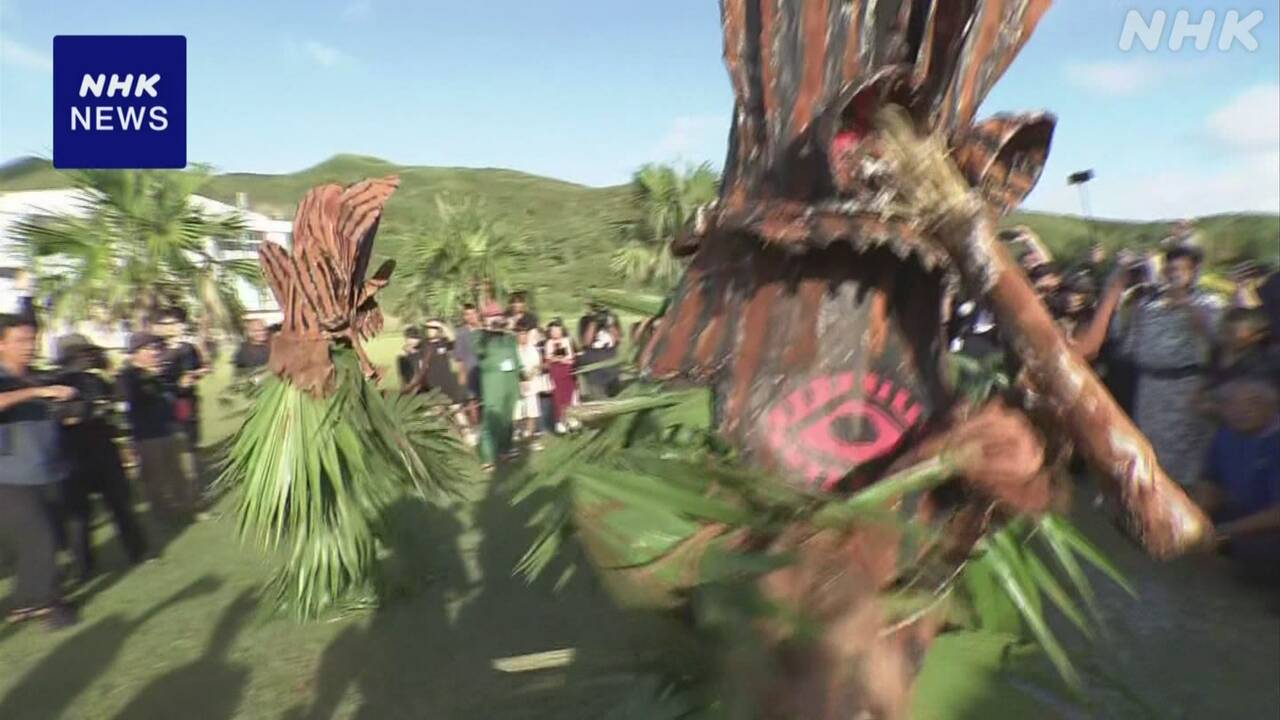Published: 2025-09-09 06:56
鹿児島 悪石島 伝統の「ボゼ祭り」 地震で島外避難の住民戻る

相次ぐ地震の影響で一時は島外に避難する人もいた鹿児島県十島村の悪石島で、島に伝わる仮面神「ボゼ」が厄払いをする伝統の「ボゼ祭り」が行われました。
悪石島に伝わる仮面神の「ボゼ」は、ビロウの葉を身にまとい、顔の上の大きな羽のようなものと見開いた目、それに大きく開いた口が特徴で、ユネスコの無形文化遺産にも登録されています。
棒の先についた赤い泥をつけられると厄が払われるとされ、7日はボゼが集まった人たちを追いかけ回すと、喜ぶ人もいれば泣き叫ぶ子どももいました。
悪石島では、6月から相次いでいる地震で一時、希望する住民が島外へ避難していましたが、これまでにすべての住民が戻っています。
泥をつけられた4歳の男の子は「怖かった」と話していました。
また、30代の母親は「無病息災になるのでよかったです」と話していました。
悪石島の盆踊り保存会の有川和則会長は「元気があってよかった。厄が払われたので、来年までは何事もなく大丈夫です」と話していました。
| # | 言葉 | 意味 |
|---|---|---|
| 4 | 悪石島 | あくせきじま (悪石島) : Akusekijima (unclass) |
| 3 | 話す | はなす (話す) : 1. to talk; to speak; to converse; to chat 2. to tell; to explain; to narrate; to mention; to describe; to discuss |
| 2 | 相 | さが (性) : 1. one's nature; one's destiny 2. custom; tradition; habit; convention |
| 2 | 次ぐ | つぐ (次ぐ) : to rank next to; to come after |
| 2 | 一時 | ひととき (ひと時) : 1. a (short) time; a while; moment 2. one time (in the past); a period; former times |
| 2 | 島外 | とうがい (島外) : off an island; away from an island; off-island |
| 2 | 避難 | ひなん (避難) : taking refuge; finding shelter; evacuation; escape; seeking safe haven |
| 2 | 伝わる | つたわる (伝わる) : to be handed down; to be introduced; to be transmitted; to be circulated; to go along; to walk along |
| 2 | 仮面 | かめん (仮面) : 1. mask 2. disguise; guise; mask |
| 2 | 神 | かみ (神) : 1. god; deity; divinity; spirit; kami 2. incredible; fantastic; amazing |
| 2 | 泥 | どろ (泥) : 1. mud; slush; (wet) dirt; mire 2. thief |
| 2 | 厄 | やく (厄) : 1. misfortune; bad luck; evil; disaster 2. unlucky year; critical year |
| 2 | 払う | はらう (払う) : 1. to pay (e.g. money, bill) 2. to brush off; to wipe away; to clear away; to dust off; to cut off (e.g. branches) |
| 2 | 住民 | じゅうみん (住民) : inhabitant; resident; citizen; population |
| 1 | 影響 | えいきょう (影響) : 1. influence; effect 2. to influence; to affect; to have an influence on; to impact; to have an effect on |
| 1 | 鹿児島県 | かごしまけん (鹿児島県) : Kagoshima prefecture (Kyushu) |
| 1 | 十島村 | としまそん (十島村) : Toshimason (place) |
| 1 | 厄払い | やくはらい (厄払い) : exorcism; ceremonial cleansing from evil influence |
| 1 | 伝統 | でんとう (伝統) : tradition; convention |
| 1 | 祭り | まつり (祭り) : 1. festival; feast 2. harassment by an Internet pitchfork mob; online shaming; flaming |
| 1 | 行う | おこなう (行う) : to perform; to do; to conduct oneself; to carry out |
| 1 | 身 | み (身) : 1. body 2. oneself |
| 1 | まとう | まとう (纏う) : to put on; to wear; to be clad in |
| 1 | 羽 | はね (羽) : 1. feather; plume; down 2. wing |
| 1 | のよ | のよ (乃代) : Noyo (unclass) |
| 1 | うな | うな (鰻) : eel (esp. the Japanese eel, Anguilla japonica) |
| 1 | もの | もの (者) : person |
| 1 | 見開く | みひらく (見開く) : to open one's eyes wide |
| 1 | 大きく | おおきく (大きく) : in a big way; on a grand scale |
| 1 | 開く | ひらく (開く) : 1. to open; to undo; to unseal; to unpack 2. to bloom; to unfold; to spread out |
| 1 | 特徴 | とくちょう (特徴) : feature; trait; characteristic; peculiarity; distinction |
| 1 | 無形文化遺産 | むけいぶんかいさん (無形文化遺産) : intangible cultural heritage |
| 1 | 登録 | とうろく (登録) : registration; accession; register; entry; record |
| 1 | 棒 | ぼう (棒) : 1. pole; rod; stick; baton 2. line; dash |
| 1 | 集まる | あつまる (集まる) : to gather; to collect; to assemble |
| 1 | 追いかける | おいかける (追いかける) : to chase; to run after; to pursue |
| 1 | 回す | まわす (回す) : 1. to turn; to rotate; to spin; to twist; to gyrate 2. to pass around; to send around; to hand around; to circulate |
| 1 | 泣き叫ぶ | なきさけぶ (泣き叫ぶ) : to cry and shout; to scream |
| 1 | 子ども | こども (子供) : child |
| 1 | 希望 | きぼう (希望) : hope; wish; aspiration |
| 1 | すべて | すべて (全て) : 1. everything; all; the whole 2. entirely; completely; wholly; all |
| 1 | 戻る | もどる (戻る) : 1. to turn back (e.g. half-way) 2. to return; to go back |
| 1 | 母親 | ははおや (母親) : mother |
| 1 | 無病 | むびょう (無病) : in sound health |
| 1 | 息災 | そくさい (息災) : good health |
| 1 | 盆踊り | ぼんおどり (盆踊り) : Bon Festival dance; Lantern Festival dance |
| 1 | 保存 | ほぞん (保存) : 1. preservation; conservation; storage; maintenance 2. saving (e.g. to disk) |
| 1 | 有川 | あらかわ (有川) : Arakawa (place) |
| 1 | 和則 | かずのり (和則) : Kazunori (given) |
| 1 | 会長 | かいちょう (会長) : president (of a society); chairman |
| 1 | 何事 | なにごと (何事) : 1. what; what sort of thing 2. everything; anything |